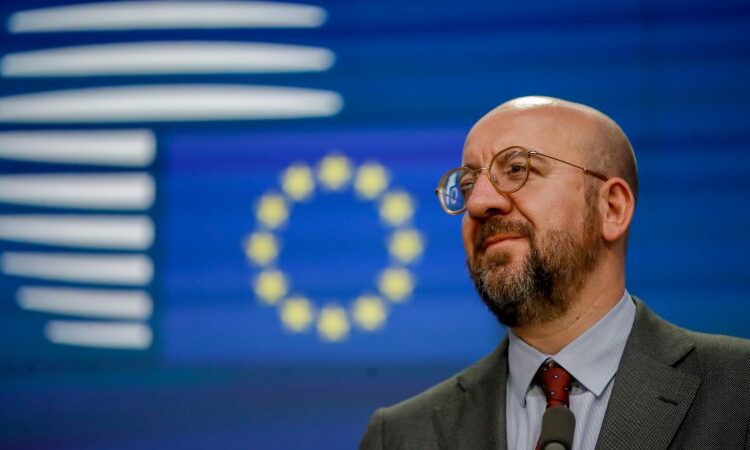
According to draft conclusions for an EU leaders’ meeting at the end of March, seen by EURACTIV, member states seem to agree on more country-specific fiscal paths instead of relying on one-size-fits-all numerical targets.
While the reference values from the EU treaties remain unchanged – at a maximum public deficit of 3% of GDP and a debt level of 60% of GDP – they will be less important in practice, as will other targets that the EU Commission currently uses to evaluate member states’ fiscal policies, according to the draft conclusions.
This is in line with the proposed course of action to reform the EU’s economic governance framework that the European Commission laid out in a communication in November.
Reforms and investments
Under the new governance framework, member states will have to present “national medium-term fiscal-structural plans” which, according to the draft conclusions seen by EURACTIV, “should cover fiscal policy, reforms, and investments”.
The current fiscal rules have been heavily criticised for deterring public investments. As such, making it easier for member states to invest was one of the key motivations behind the reform of the fiscal rules.
“The plans should set a national fiscal path defined in terms of net primary expenditures as a single operational indicator,” the draft conclusions read, which is also in line with what the European Commission proposed.
Net primary expenditure measures all the money a government spends minus the government revenues, excluding government expenditure for interest payments and cyclical unemployment. Excluding expenditure for interest payments is important for countries that have to pay a higher risk premium when they issue government bonds.
In general, the national fiscal paths are meant to allow the Commission to better take into consideration the national circumstances and economic needs when evaluating their fiscal policy. However, fiscally more conservative countries like Germany or the Nordic countries fear that individual plans would make it hard to enforce debt sustainability.
European control
That’s why the national fiscal paths should be “coherent with the technical fiscal trajectory from the Commission”, the draft conclusions state.
“The Commission trajectory should be based on a common methodology to be agreed that is replicable, predictable and transparent, and should include an analysis of public debt challenges,” the document reads.
It continues: “The plans and possible updates should be assessed by the Commission in a fully transparent manner, based on common assessment principles to be agreed, and be subject to multilateral scrutiny and endorsement by the Council.”
The insistence on replicability makes the Commission’s task of coming up with an acceptable methodology especially hard since it also needs to be able to take into account a variety of country-specific investments and reforms.
Democratic control
The national fiscal plans under the reformed economic governance framework would span over several years, raising questions about democratic control. Would a new government be bound by the budgetary decisions of an old, ousted government that first set up the national fiscal plan?
The draft conclusions also address this issue, saying that “all plans could be aligned, upon request, with the national electoral cycle, revised with the accession of new governments, and updated in objective circumstances while upholding the ambition of the fiscal adjustment.”
Although the national fiscal plans in highly indebted countries should lead to decreasing debt levels in the medium term, the fiscal adjustment period can be extended under certain conditions.
These include “reforms and investments that [enhance] growth-prospects or resilience, [strengthen] public finances and thereby their long-term sustainability, and [address] EU strategic priorities, including public investment challenges for the green and digital transition and the build-up of defence capabilities.”
A more lenient treatment of defence spending is a key ask of EU countries in Central and Eastern Europe, especially Poland.
Sanctions
Regarding the reference value for public deficits, a deficit higher than 3% can still lead to an excessive deficit procedure, as it does under the current rules. The draft conclusions state that the procedure should also be triggered if a member state with a debt level above the 60% of GDP threshold deviates from its fiscal path.
However, as the European Commission proposed in 2022, financial sanctions for deviating from the fiscal rules should be lowered, according to the document. This should make it politically easier to actually implement them.
The draft conclusions do not mention the possibility of reputational sanctions, like a hearing of the deviating government’s finance minister in front of the European Parliament. This idea had been floated by the Commission communication.
Country-specific escape clauses
Furthermore, the document addresses the possibility of country-specific escape clauses. The current fiscal rules have a general escape clause, which has been triggered since the start of the pandemic in 2020, and which allows all member states to deviate from the fiscal rules for the time being.
The member states want to “explore” or “introduce” country-specific escape clauses “in order to adapt to exceptional circumstances such that the fiscal adjustment path could not realistically be adhered to and allow for temporary deviations from the medium term plan”.
EU leaders will discuss the fiscal rules when they meet in Brussels on 23 and 24 March, when they will also discuss a range of other economic policy issues, for example, the EU’s reaction to the US Inflation Reduction Act.
Luca Bertuzzi contributed to the reporting.
[Edited by Nathalie Weatherald]








